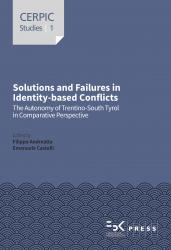Solutions and Failures in Identity-based Conflicts
The Autonomy of Trentino-South Tyrol in Comparative Perspective
Filippo Andreatta, Emanuele Castelli (edd)

Numero: 1
Editore: FBK Press
Città: Trento
Anno: 2014
Pagine: 287
E-book
| ISBN: | 978-88-98989-10-2 |
Libro
Perché certi conflitti identitari sfociano in aperta violenza mentre altri si risolvono senza l’uso (o con un uso limitato) della forza? Cosa permette alle parti, in questi ultimi caso, di giungere a un accordo durevole e mutuamente soddisfacente? A partire dagli assunti riconducibili alla teoria razionalista della cooperazione di matrice liberale-istituzionalista, e tenendo in considerazione le critiche realiste, il volume presenta un modello teorico che sottolinea l’importanza, durante i negoziati, delle soluzioni politico-compensative (side payments e issue linkage), della simultaneità (o di un suo sostituto funzionale) tra negoziati e implementazione degli accordi e del ruolo delle terze parti.Sono presi in esame otto casi di conflitti identitari (Trentino Alto-Adige/Südtirol, Catalogna, Cipro, Myanmar, Kurdistan iracheno, Montenegro, Egitto e Mali) per verificare se il modello di soluzione preventiva del conflitto avutosi nel caso trentino-altoatesino/sudtirolese possa gettar luce sia sulle cause del loro successo che sul perché del loro fallimento.
Indice
Filippo Andreatta - Preface
Emanuele Castelli - Introduction
Emanuele Castelli - Solution of an Identity-based Conflict: The Case of South Tyrol
Francesco Raschi - Historic and Political Review of the South Tyrol Dispute
Elisabetta Pulice - South Tyrol’s Autonomy after the Conflict Settlement. Compromise, Power Sharing, and the Rights of Language Groups
Miriam Rossi - Catalonia and the “dret de decider”
Patrick Morgan and Elena Baracani - The Cyprus Conflict and the Failure of Its Europeanization
Matteo Dian - Does Liberalization Make Peace? Political Opening and the Karen Insurgency in Myanmar
Massimo Morelli and Costantino Pischedda - Oil, Federalism, and Third-Party Intervention: An Assessment of Conflict Risk in Iraqi Kurdistan
Siniša Vukovi? - EU Mediation in Montenegro: Normative Power as a Source of Linkage Strategies and Non-material Side Payments
Marco Pinfari - The Coptic Community and Religious Strife In Egypt
Arrigo Pallotti and Lorenzo Zambernardi - Resolving the Tuareg Question. Internationalizing the Implementation of Peace Agreements in Mali
Filippo Andreatta and Emanuele Castelli - Solutions and Failures in Identity-based Conflicts.The Theoretical Framework
Autori
Filippo Andreatta is Professor of Political Science at the University of Bologna, where he teaches International Politics and Strategic Studies. He obtained an MA at Columbia University and a PhD at the London School of Economics. He is the author of 3 monographs, coauthor of a handbook on International Relations theory and has edited two books. He is also author of more than 50 chapters or articles in journals in both Italian and English. He has coordinated research projects for the Italian Ministry of University and Research, the Ministry of Foreign Affairs and the OECD. He is currently the director of the Center on International Politics and Conflict Resolution (CERPIC) of the Fondazione Bruno Kessler (Trento - Italy). He has written op-eds for the “Corriere delle Sera” since 2005 and for “Il Sole 24 Ore” since 2012, and he is vice-president of the Arel think tank in Rome.
Emanuele Castelli is a Postdoctoral Research Fellow at the Research Center on International Politics and Conflict Resolution (CERPIC) of the Fondazione Bruno Kessler (Trento - Italy). He received a PhD in Social Sciences from the University of Parma. He has been Adjunct Professor of Strategic Studies and International Politics at the University of Bologna (Forlì campus) and Visiting Scholar at the University of California at Irvine. Among his most recent publications is From Democracy to Capitalism. The War over the Liberal Peace, in “Rivista Italiana di Scienza Politica”, n. 3/2013 (with Tyson Chatagnier).
Parole chiave
- Conflitti etnici
- Gestione
- Trentino Alto Adige
- Autonomia

